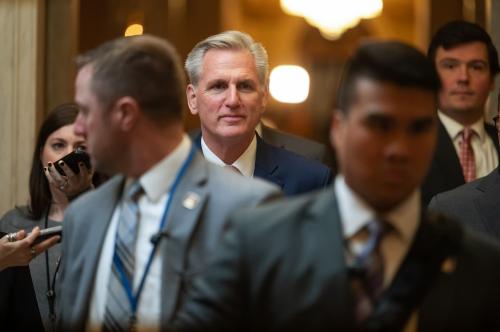Congress has a problem when it comes to the lack of representation among the many roles in the legislative branch: non-white people compose approximately 11% of senior staffers in the Senate and 21% in the House, as well as approximately one-quarter of elected members in both chambers. Diversity among elected members and staffers is gradually improving, and a variety of deliberate initiatives, including the creation of a formal House Office of Diversity and Inclusion and Senate Democratic Diversity Initiative, seek to improve the situation further. But discussions on some of the nation’s most critical problems still often lack the perspectives of stakeholders from diverse racial or ethnic backgrounds. Committee hearings on many important issues, for example, disproportionately feature testimony from white or male witnesses, excluding the expert opinions from a range of voices from other racial and ethnic backgrounds.
In technology and telecommunications policy areas, this omission is particularly obvious—especially given the lack of diversity in the technology industry’s leadership and workforce. Tech policies encompass numerous issues that impact individuals and communities, including broadband access and the implications of artificial intelligence (AI). Consequently, it is important that committee hearings become more inclusive not only to avoid the temptation to override the concerns of women and people of color, but also to minimize any unintended consequences that future policies may have on underrepresented populations.
For these reasons, several provisions in the House of Representatives’ newly passed rules package for the 117th Congress stand out. In addition to formally codifying the Office of Diversity and Inclusion in the House rules, the package requires the office to submit a plan to track the diversity of House hearing witnesses by July, after which the House Committees on Administration and Rules are directed to implement it. A second important provision establishes a new Select Committee on Economic Disparity and Fairness in Growth. These changes signal an increased emphasis on including diverse perspectives in the lawmaking process—which in turn presents an opportunity to hear from a broader range of experts and to explore more policy topics, especially in areas like technology and telecommunications that have broad impacts on all.
Improving witness diversity in technology policy hearings
In the 116th Congress, House and Senate committees held numerous hearings to examine consequential issues like broadband, privacy, online extremism, misinformation, Section 230, and artificial intelligence. Congressional hearings are an important venue to improve accountability for technology companies; members can publicly engage with witnesses on issues, seeking on-the-record comments about pending or future legislation.
Yet, witnesses from diverse racial and ethnic backgrounds were noticeably absent from these recent hearings. In addition to the fact that executives of color are grossly underrepresented among the CEOs of big tech companies who attract the most attention at congressional hearings, other hearings on important technology and telecommunications issues had little representation of diverse voices more broadly. When committee hearings lack input from experts with the lived experiences of diverse racial and ethnic groups, members do not hear about policy implications that may either foreclose on opportunities for underrepresented populations or limit the reach of their potential legislation.
The omission of people of color in technology hearings reflects a larger workforce problem, given the underrepresentation of Blacks and Latinxs in computer science or engineering fields. By recent estimates, approximately 5.7% of computer hardware engineers identify as Black and 10.2% identify as Hispanic or Latinx; meanwhile, 4.2% of new engineering college graduates identify as Black and 11.4% identify as Hispanic or Latinx. These disparities increase when considering both gender and seniority: Latinx and Black women each hold under one percent of technology leadership positions in Silicon Valley, and only three Fortune 500 CEOs identify as women of color.
Yet, it is important for the 117th Congress to address witness diversity, especially given the expanded focus on creating pathways to racial equity in the United States. The new Congress is expected to address consequential concerns around facial recognition technologies, the deployment of high-speed broadband networks in rural and urban areas, the risks of disparate impacts for people of color resulting from biased algorithms, and strong framing of civil rights in federal privacy legislation—all topics that will require input from those most affected by policy decisions. While many congressional committees have jurisdiction over technology policy issues that can aid or detract from racial equity, these topics will be major components of the legislative agendas for the House and Senate Judiciary Committees; House Energy and Commerce, Science and Technology, and Transportation and Infrastructure Committees; Senate Commerce Committee; and the relevant House and Senate Appropriations Subcommittees.
Policy topics for the new Select Committee on Economic Disparity and Fairness in Growth
The House rules package also stands up a new Select Committee on Economic Disparity and Fairness in Growth, which is tasked with developing recommendations “to make our economy work for everyone, empowering American economic growth while ensuring that no one is left behind in the 21st Century Economy.” The Select Committee has a broad investigative mandate, including the ability to hold public hearings, but does not have the authority to report bills and resolutions or issue subpoenas. Instead, Select Committee members are charged with submitting reports and recommendations to the appropriate authorizing committees. Much of the agenda for the Select Committee has yet to be determined, as Speaker Nancy Pelosi (D-Calif.) and Minority Leader Kevin McCarthy (R-Calif.) have not appointed members to the panel.
That said, a Pelosi press release outlines potential committee priorities: “economic fairness, access to education and workforce development.” And there are plenty of sub-issues within these broader topics that the committee would be well-positioned to investigate. For example, the committee could investigate how automation impacts workers, wages, and the labor market—especially since race and gender intersect with such effects.
Other technology policy topics could include the impacts of algorithmic bias in eligibility determinations around hiring, mortgage applications, housing, and credit scoring—all topics that have disproportionately impacted people of color.
An examination of the U.S. digital divide and its impact on productivity, learning, and civic engagement (e.g., applying for public benefits or voting) is also relevant to remedying economic disparities and addressing fairness. Another possible focus for the Select Committee could be the relationship between limited pathways to STEM careers and the future of work, also as a way to unpack the extent to which systemic inequalities and discrimination can stall the social mobility of populations traditionally underrepresented in these areas.
Finally, the Select Committee could explore the intersections of traditionally distinct policy areas, such as transportation and technology, or housing and AI. Several committees have already grandfathered in subgroups, like the Task Force on Artificial Intelligence under the House Financial Services Committee, to determine the implications of biased algorithms in the finance sector.
Once in operation, the Select Committee on Economic Disparity and Fairness in Growth can address technology policy concerns from a more comprehensive lens, thereby promoting more collaborative, forward-thinking policies.
Conclusion
Achieving racial equity will be a focus of the 117th Congress and, in doing so, it is necessary to include women and people of color in the lawmaking process. As Rep. Al Green (D-TX) lamented last year, “What subliminal message are we sending to the world when we have [hearing] experts but not one person of color?” While this rules package applies to the House of Representatives only, Senate practices may change now that Democrats have gained control of the chamber. But with efforts to document the diversity of House witnesses, along with the creation of the Select Committee, the House of Representatives could be positioned to address a greater diversity of issues—such as the larger societal implications of technology—and any social or economic gaps that could result from future legislation.
This work is licensed under the Creative Commons Attribution-NonCommerical-NoDerivatives 4.0 International License. To view a copy of the license, visit https://creativecommons.org/licenses/by-nc-nd/4.0/.
The Brookings Institution is committed to quality, independence, and impact.
We are supported by a diverse array of funders. In line with our values and policies, each Brookings publication represents the sole views of its author(s).











Commentary
With new House rules, more diversity in technology legislation and hearings is possible
January 21, 2021